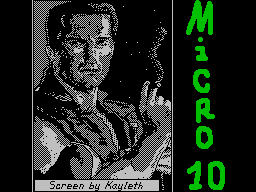|
Micro #10
28 ноября 1998 |
|
Tape and Disk - Adapting programs to the system TR-DOS (Part 4).

ADAPTATION PROGRAMMES OF SYSTEM TR-DOS
CHAPTER 4
LOADER, native
-------------------------------
for those who do not know what
machine code.
Despite the fact that knowledge of assembler is not
is required to understand
what I'm going to write on, it does not
hurt. Even more useful is the ability to use any monitor,
disassembler, I recommend to use program from the package
Ultraviolet / Infrared. This is the first assembler and
disassembler, which appeared on the market for the ZX Spectrum.
The program is easy to use and quite acceptable for the
solution of those tasks that will be dealt with in this
chapter. Later you would have to switch to something more
serious (eg, STS 6.2).
To present a consistent and clear organization of
downloading files from the machine code for nepodgotolennogo
user's task is more than difficult, but you can try.
Let's start with the easiest. Suppose
that the tape has a program consisting
four files: the file to BASIC, the code file and two files with
no header. Having studied BASIC program, you've come to the
conclusion that it loads the code file and runs it
from address 65000.
With a Copy you have determined that
code file is loaded from address 65000 and
has a length of 30 bytes, the length of the file without the
header is respectively 6912 and 32768 bytes.
Now run the code file where
him to be laid, but do not run
it, and your disassembler. Disassemble
memory is needed, starting at address start-up, that is, from
the address 65000. Suppose disassembler that showed the
following:
65000 LD IX, 16384; starting address
65004 LD DE, 6912, the length
65007 LD A, 255
65009 SCF
65010 CALL 1366; call Subprogramme, we load
65013 LD IX, 25000; starting address
65017 LD DE, 32768, length
65020 LD A, 255
65022 SCF
65023 CALL 1366; call Subprogramme, we load
65026 JP 40000; run the program
65029 NOP
I do not presume to explain the meaning of all these
zakoryuchek. If you know what they stand for your happiness, if
not, and God bless You. To a little bit to deal with boot
loaders, you need to remember that after LD IX should be
addressed to download the file, after LD DE its length.
Mnemonics LD A, 255, and SCF set the registration system, and
CALL 1 366 calls a subroutine boot
tape. Address after the CALL may vary
Depending on whether you use the standard boot loader routine
loading, located in ROM (as in this example), or their own.
Thus, we learned that the loader
Download two files, the first of which (6912 bytes in length
and load address 16384), obviously, screensaver, and the second
(32768 and 25000, respectively), the main program file (note
that data on length of the file match the data provided by
copyists), in addition, we learned that the program starts at
address 40000.
Using these data, we can begin to
adaptation programs.
Perhaps the hardest thing that will be
to do is write the two files without the headers on the disk.
If you have a program PCopier, PCopier Plus or L-COPY, then the
problem is somewhat simplified. Will be sufficient to copy the
files to disk and then run the following program:
10 RANDOMIZE USR 15619: REM:
LOAD "less 001" CODE 16384
20 RANDOMIZE USR 15619: REM:
SAVE "screen" SCREEN $
30 RANDOMIZE USR 15619: REM:
LOAD "less 002" CODE 25000
40 RANDOMIZE USR 15619: REM:
SAVE "main" CODE 25000,32768
Of course, addresses and file names are only suitable for
this example.
However, there are many ways to copy files without using
special kopiroschikov. We give the most simple for this
example, the method (basically, it is suitable for most cases).
After downloading the file, the loader, as
Typically, runs the program. Usually,
It uses the already mentioned team
JP XXXXX, where XXXXX address programmy.Chtoby start to get a
copy of the file, need to download the files into memory from
tape and burn them to disc. You can use ready-made boot, after
replacing instuktsiyu that triggers program, the instruction
returns control to the BASIC interpreter, that is instead of
the entity to supply JP RET, code is 201. In our example, this
can be achieved by performing an operator POKE
65026.201. The value of the address, where the user JP, change
to 201 (command RET), which will ensure a return to the
beysiksistemu after downloading both files.
Preparing such a code loader
way, you can run it, not forgetting to provide a record of
files on the disc after completion of boot. It is convenient to
collect program in a few lines:
10 RANDOMIZE USR 65000: REM Start of
longshoreman
20 RANDOMIZE USR 15619: REM:
SAVE "screen" SCREEN $
30 RANDOMIZE USR 15619: REM
SAVE "main" CODE 25000,32768
When you see the message
successful completion of the program, you will only have to
write the loader from the disk, with What I hope no
difficulties will arise.
Chapter 5 "How To Fight RAMTOP'om," You
See the next issue of Micro.
---------------------------
03/12/1998. Gloom Demons Inc.
C.E. special for Micro 10.
Other articles:
BBS - Full description of work with BBS for Spectrum. |
Opinion - an overview of game genre D & D - Last Herp of Light Force. |
Tape and Disk - Adapting programs to the system TR-DOS (Part 4). |
Humor - a compilation of anecdotes. |
Pokes - a compilation of Poke's. |
Similar articles:
В этот день... 13 February